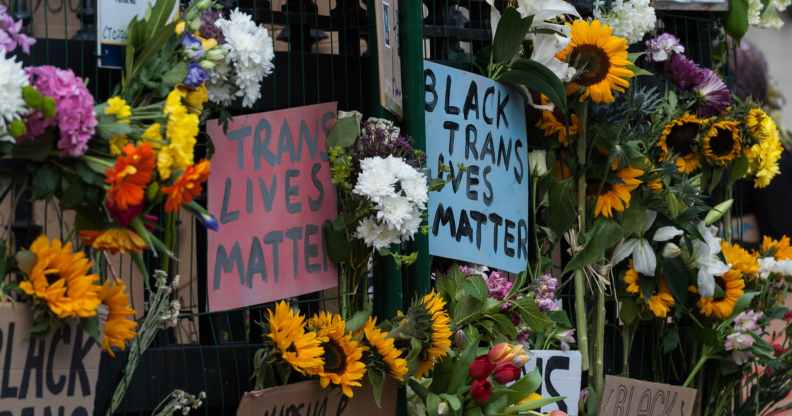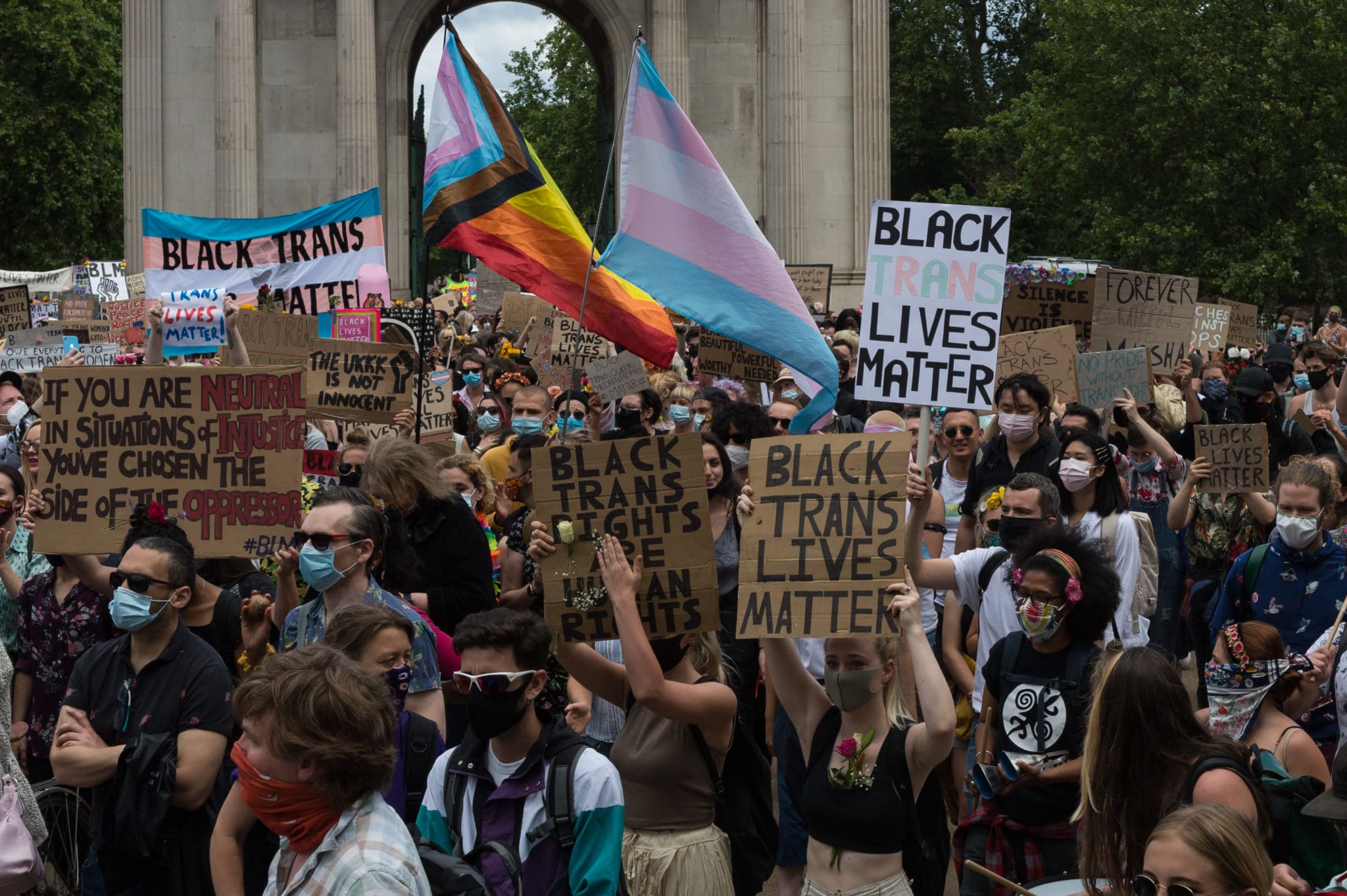Meet the transgender trailblazers fighting to empower their community against a tide of surging transphobia

Flowers and placards after the Black Trans Lives Matter march in London, June 2020. (WIktor Szymanowicz/NurPhoto via Getty Images)
Flowers and placards after the Black Trans Lives Matter march in London, June 2020. (WIktor Szymanowicz/NurPhoto via Getty Images)
A sad yet familiar fact to British transgender people is that the UK is a hotbed of relentless transphobic campaigning.
And it’s not been without its successes: institutional transphobia stretches from the media and the government to schools, hospitals and the streets we live on. As a result, half of trans people in the UK are afraid to use a public bathroom.
Misinformation and outright lies about trans lives are commonplace. Trans kids, and the parents who support them, are vilified by newspaper columnists. And for those people who don’t have a trans family member or friend, the transphobic media is the primary source of information about trans rights.
Trans activists who fight for those rights also fight against the negative portrayal of trans lives in the media. One such organisation, which has undergone a resurgence in the last six months off the back of the Conservative equalities chief Liz Truss’ statements about trans rights, is TransActual UK. PinkNews spoke to the organisers to learn more.
What is TransActual?
TransActual has been around for several years now, seeking to provide the trans and non-binary communities and allies with the information and tools needed to combat the rampant transphobia within UK society.
It is a uniquely trans-led organisation that works to highlight issues, dispel myths, empower individual trans and non-binary people and, where appropriate, to advocate for them.
In the wake of Liz Truss’ attempt to roll back trans rights earlier this year, we felt that it was time to step up our activities. We relaunched as a community interest company in July, and since then we have been busy recruiting, fund-raising, and building campaigns.
This year we've raised trans people's voices; run workshops; expanded our online work; educated policy makers; started a non-binary recognition project; and so much more. As our remit has expanded, so have our costs. Your donation can help us keep working: https://t.co/hZfDJ6D1vP pic.twitter.com/rGuhwR1aMh
— Trans Actual (@TransActualUK) November 12, 2020
After the big relaunch, what can we expect to see in the coming months and years?
More. More projects. More action. More of everything. And the more that trans people support us, the more successful we will be.
Right now, our focus is on healthcare, where we are raising funds to put together an initiative to improve GP treatment of trans individuals and to equip trans people with the knowledge to know what they should be able to expect from their GP.
We are working within the non-binary community to develop a viable manifesto around non-binary recognition.
And we are providing a community voice through research that focuses on the intersectional issues that lie at the heart of hate and discrimination
Who are the people behind TransActual?
The four people taking the helm right now are: writer and long-term campaigner for LGBTQI and women’s rights, Jane Fae; entrepreneur, politician and long-term campaigner for LGBT rights, Helen Belcher; trans rights campaigner and trade union activist, Chay Brown; and racism radio show producer, activist and writer, Rico Jacob Chace.
Together, we constitute a solid base of experience and enthusiasm reaching across the generations. Although to say that would be to under-state the wider network that underpins us. We have a team of volunteers that have been involved in our work planning and prioritisation, as well as helping with the day to day running of the organisation: many, many more people are busy working behind the scenes on the various projects highlighted above.
“I face a huge barrier even leaving the house. When I do go out I get 'the look'. Turned heads, sideways stares. It's intimidating and scary. I am in a medium sized market town in the Midlands and people are so closed minded.” Hazel#transawarenessweek pic.twitter.com/RL1IDXrpb8— Trans Actual (@TransActualUK) November 16, 2020
As for why: the turning point for us, as for many others, was the weekend when it looked as though Liz Truss was about to roll back on trans rights. The level of dismay in the community was palpable, and so much fear was going the rounds.
And then, pretty much the next day, that seemed to change. Trans people who had been trying to keep their heads down and fingers crossed decided enough was enough. There needed to be a broad-based community effort to fight back against this hatred – and so it was decided to move TransActual up to the next level.
What are the main challenges for trans and non-binary people living in the UK right now?
Hate: not just on the street, but sadly, in government and in the media.
Discrimination: this is consequence of hate, and also arises from the fact that trans people are still all too poorly understood.
Z needs some help to recover from rape and homelessness and her friends are crowdfunding to ensure that she has the funds to do this safely whilst also being able to transition.https://t.co/vYrvLaGASY#FundingSunday pic.twitter.com/ngA1Rjd6z1— Trans Actual (@TransActualUK) November 15, 2020
Health: had anyone asked the trans community, that – not Gender Recognition Act reform – is the thing we needed fixed. Decent support – and sufficient. This covers the whole of healthcare, not just the transition-related bits, as too many people feel excluded in all sorts of areas. But, we understand, that might have cost money: and therefore reforming a process was a much easier option.
There are specific issues that Black trans people face in the UK, how will TransActual be tackling these?
As always the first step in understanding a community is to bring them to the table and amplify Black voices! Our director Rico has Jamaican heritage and TransActual has and always will ensure diversity and representation in all discussions, from board meetings to round tables.
The Black community is saying intersectionality, intersectionality, intersectionality! Being Black and trans/non-binary/gender non-conforming is comparatively more turbulent in the Black communities due to the legacy of homophobia and transphobia instilled in their communities during colonialism.
As a result, homelessness, disownment and internalised transphobia are rampant and understandably lead to disproportionate cases of depression and anxiety.

Black Trans Lives Matter march in London, June 2020. (Wiktor Szymanowicz/Barcroft Media via Getty Images)
Further education and the stress-free comfort that comes with it is a comparative rarity for this demographic and not from lack of trying. Financially risky zero-hour contracts and retail jobs are common, as professional environments are still coming to terms with the mere existence of trans people. Add racism and race-related healthcare biases, such as higher pain tolerances, and we have a perfect storm.
The Black community is looking to heal and to have the resources to do so. Homeless shelters, pre-colonial gender education, therapy sessions and safe spaces are what are needed.
TransActual has recognised that the first point of change is to prove there is a problem. Our Community Voice Survey is specifically designed to demonstrate intersectionality between trans and Black identities, and to highlight how Black respondents were disproportionately impacted by COVID.
With statistics in hand activists and allies, from grassroots organisations to civil servants, will be aware and can campaign to allocate resources to where it’s needed the most. TransActual will be launching several projects focused purely on amplifying Black voices such as interviews, blogs and career sessions – the aim being to inspire confidence in our communities, raise awareness for more allies and, most importantly, create a budding future for this demographic.
What is the Gender Recognition Act and what's wrong with it? You'll find plenty of info on our website: https://t.co/G6ZDBlSaBT pic.twitter.com/6qvNRUN6lD— Trans Actual (@TransActualUK) November 14, 2020
Who are you inspired by and why?
We’ll go with Phyllis Akua Opoku-Gyimah – aka Lady Phyll. She is a brilliant role model for the LGBT+ community, not just for all the things she has personally achieved, but from the fact that her trademark style involves fostering links between different communities and encouraging working together.
From outside it is too easy to view “trans” as one undifferentiated blob: but we are a community of communities. And we are at our most effective when we work together.
What does trans liberation look like to you? How will we know when we’re there?
You mean apart from when we have transed all the crocodiles?
In short, when trans people are no longer remarkable, no longer singled out as unusual or topic for debate.
In many ways it looks like nothing. There will be support as far as it is needed: more direct medical support for binary trans folk, adult and child alike, different support for non-binary people.
Our ambition for the trans world is full acceptance: and the sooner everyone agrees that we are wholly boring and “nothing to see here” the better. We think we are a little like dentists – always trying to make sure we are not needed.

